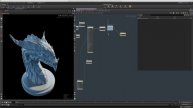#BIOAI2017 Caswell Barry, UCL: What can AI contribute to Neuroscience?
If you are interested to hear more about the advancements of Artificial Intelligence in Bioscience, join Special Interest Group on Artificial Intelligence in Biomedicine http://benevolent.ai/blog/benevolentai/join-the-special-interest-group-on-artificial-intelligence-in-biomedicine/
Dr Caswell Barry, Principal Research Associate, UCL Cell & Development Biology joined the Artificial Intelligence in Bioscience Symposium 2017.
Abtract: The last five years have seen huge gains in the capability of machine learning, particularly deep learning and deep reinforcement learning, approaches that have been shaped by our understanding of the mammalian brain. Indeed, there has been considerable dialogue regarding the extent to which these fields should continue to be influenced by neuroscience. However, there has been far less information flow in the opposite direction; while the machine learning field has been effective at absorbing lessons from neuroscientists, the potential for machine learning to inform our understanding of the brain is only now starting to be explored. By presenting preliminary work from my own lab as well as work conducted in other labs, I will make the case that machine learning provides a new way to understand how information is processed and transformed in the brain. In short, not only do machine learning techniques provide a powerful set of tools for dealing with large neural datasets, they also provide a way of building and testing models of the brain.
Видео #BIOAI2017 Caswell Barry, UCL: What can AI contribute to Neuroscience? автора Green Thumb Gems
Видео #BIOAI2017 Caswell Barry, UCL: What can AI contribute to Neuroscience? автора Green Thumb Gems
Информация
17 февраля 2025 г. 1:28:09
00:28:53
Похожие видео
![[Курс «Продвинутые инструменты аналитики ТИМ-данных»] Инструменты выборки табличных данных](http://pic.rutubelist.ru/video/2025-04-28/45/23/452381563108de8174ee66233e706e39.jpg?size=s) [Курс «Продвинутые инструменты аналитики ТИМ-данных»] Инструменты выборки табличных данных
[Курс «Продвинутые инструменты аналитики ТИМ-данных»] Инструменты выборки табличных данных Alegerea ochelarilor potriviti - www.iris-optic.ro
Alegerea ochelarilor potriviti - www.iris-optic.ro Sridevi with Jaya Bachan and Hema Malini
Sridevi with Jaya Bachan and Hema Malini DOGE MINER FREE НОВЫЙ МАЙНИНГ DOGE C БОНУСОМ 2 DOGE
DOGE MINER FREE НОВЫЙ МАЙНИНГ DOGE C БОНУСОМ 2 DOGE Песня моих красавиц
Песня моих красавиц 200 meters from the Palais des Festivals in Cannes, FRANCE/200 метров от дворца Фестивалей в Каннах
200 meters from the Palais des Festivals in Cannes, FRANCE/200 метров от дворца Фестивалей в Каннах Изменение доступности номера | Экстранет Островок
Изменение доступности номера | Экстранет Островок Как компьютерное зрение делает футбол ещё зрелищнее
Как компьютерное зрение делает футбол ещё зрелищнее Chokeberry +
Chokeberry + Сказка "Как собака друга искала". Д/с Золотой ключик, г. Новоалтайск
Сказка "Как собака друга искала". Д/с Золотой ключик, г. Новоалтайск Как “Качество работы” на Авито повлияет на рейтинг? #Авито #услуги #качествоработы #рейтинг
Как “Качество работы” на Авито повлияет на рейтинг? #Авито #услуги #качествоработы #рейтинг Новости ИИ от OpenAI, Manus AI, Grok, Siri и Perplexity, Lovable, Windsurf, Аватары...
Новости ИИ от OpenAI, Manus AI, Grok, Siri и Perplexity, Lovable, Windsurf, Аватары... 1000015676.mp4
1000015676.mp4 Eliminator 224 Seed Cleaner on Camelina Seed
Eliminator 224 Seed Cleaner on Camelina Seed Transformation Center Prayer #195
Transformation Center Prayer #195 NebulosA - Canción: "MANDRAGORA" (Goth Metal Alternativo) - Desde Studio Live (Zamora, Michoacán)
NebulosA - Canción: "MANDRAGORA" (Goth Metal Alternativo) - Desde Studio Live (Zamora, Michoacán) jungle park
jungle park sorgun türk telekom lisesi aşk acısı çekenleree DAMAR dinleyen bir kez daha dinleyecekktirrr..
sorgun türk telekom lisesi aşk acısı çekenleree DAMAR dinleyen bir kez daha dinleyecekktirrr.. 6.09. Displacement and Bump
6.09. Displacement and Bump Архитектурный мэппинг в Екатеринбурге T2 x Creater pro
Архитектурный мэппинг в Екатеринбурге T2 x Creater pro
